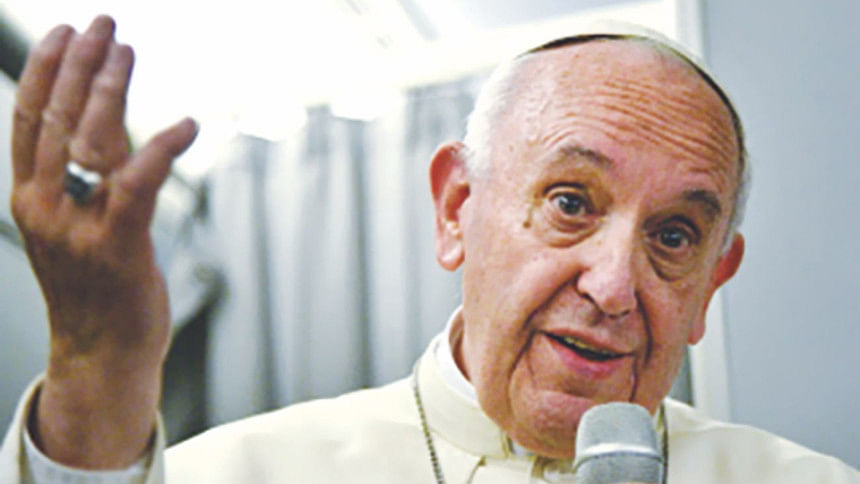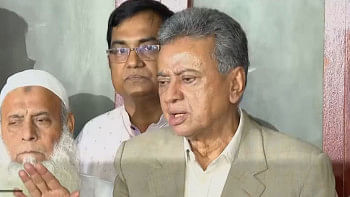Pope defends his Myanmar strategy

Pope Francis on Saturday defended his strategy of avoiding the term "Rohingya" in Myanmar, saying he believed he got his message across to both the civilian and military leadership without shutting down dialogue.
Speaking to reporters aboard the plane returning to Rome from Bangladesh, the pontiff also indicated that he had been firm with Myanmar's military leaders in private meetings about the need for them to respect the rights of Rohingya refugees.
He also disclosed that he cried when he met a group of Rohingya refugees on Friday in Bangladesh, where he defended their rights by name in an emotional meeting, reports Reuters.
"For me, the most important thing is that message gets through, to try to say things one step at a time and listen to the responses," he said.
"I knew that if in the official speeches I would have used that word, they would have closed the door in our faces. But [in public] I described situations, rights, said that no one should be excluded, [the right to] citizenship, in order to allow myself to go further in the private meetings," he said.
Francis did not use the word Rohingya in public while on the first leg of the trip in Myanmar. Predominantly Buddhist Myanmar does not recognise the mostly Muslim Rohingya as an ethnic group with its own identity but as illegal immigrants from Bangladesh.
The pope met Myanmar's military leaders privately last Monday, shortly after his arrival in the nation's biggest city, Yangon.
The meeting had been scheduled for Thursday morning but the military pointedly asked at the last minute that it be pushed forward. The result was they saw the pope before the civilian leaders instead of the other way around, as had been planned.
NON-NEGOTIABLE TRUTHS
"It was a good conversation and the truth was non-negotiable," he said of his meeting with the military leaders.
The latest exodus from Myanmar to Bangladesh of about 625,000 people followed a Myanmar military crackdown in response to Rohingya militant attacks on an army base and police posts on August 25.
Refugees have said scores of Rohingya villages were burnt to the ground, people were killed and women were raped. The military have denied accusations of ethnic cleansing by the United States and United Nations.
Asked if he used the word Rohingya during the private meeting with the military chiefs, the pope said: "I used words in order to arrive at the message and when I saw that the message had arrived, I dared to say everything that I wanted say".
He then gave a reporter a mischievous grin and ended his answer with the Latin phrase "Intelligenti Pauca," which means "Few words are enough for those who understand," strongly hinting that he had used the word the military detests while in their presence.
Human rights groups have criticised the country's de facto civilian leader, Aung San Suu Kyi, a Nobel Peace Prize winner who was under house arrest for a total of 15 years before the 2015 elections, for not taking a stand against the generals.
But Francis, who met with her privately on Tuesday, appeared to give her the benefit of the doubt because of her delicate relationship with the generals who were once her jailers.
"Myanmar is a nation that is growing politically, in transition," Francis said in response to a question about Suu Kyi and budding democracy in Myanmar.
"So things have to be viewed through this lens. Myanmar has to be able to look forward to the building of the country".
On Friday, Francis held an emotional encounter with Rohingya refugees from Myanmar and then used the word Rohingya for the first time on the trip, although he had defended them by name twice from the Vatican earlier this year.
He told the crowd where the Rohingya were that God's presence was within them and they should be respected.
"I was crying and tried to hide it," Francis said on the plane, recounting how moved he felt when the refugees recounted their ordeals to him.
SOCIAL MEDIA REACTIONS
Pope's comments sparked a flurry of online anger in Myanmar, a country locked off from modern communications for five decades but which now has an active social media.
"He is like a lizard whose colour has changed because of weather," said Facebook user Aung Soe Lin of the pope's strikingly different stances on the crisis.
"He should be a salesman or broker for using different words even though he is a religious leader," said another Facebook user called Soe Soe.
Myanmar's Catholic church had advised Francis not to stray into the incendiary issue of the status of the Rohingya in Myanmar, in case he worsened tensions and endangered Christians.
On his Myanmar trip, he treaded softly on the topic, urging unity, compassion and respect for all ethnic groups -- but not naming the Rohingya.
His caution initially won applause from Myanmar's tiny Catholic minority -- who feared a nationalist blowback -- as well as from Buddhist hardliners, who are on the defensive after a global outcry about the treatment of the group, AFP writes.
"The Pope is a holy person... but he said something here [in Myanmar] and he said different in other country," another Facebook user Ye Linn Maung posted.
"He should say the same things if he loves the truth."
Others were more sanguine about Francis' choice of language once he had left Myanmar soil.
Maung Thway Chun, chairman of an unofficial party of nationalists called the 135 Patriots Party, applauded the pope's decision not to name them in Myanmar despite pressure from rights groups.
“It means he respects Myanmar people," he said. "He even did not use the word many times in Bangladesh... I think he said it once, just to comfort human rights organisations."

 For all latest news, follow The Daily Star's Google News channel.
For all latest news, follow The Daily Star's Google News channel. 



Comments